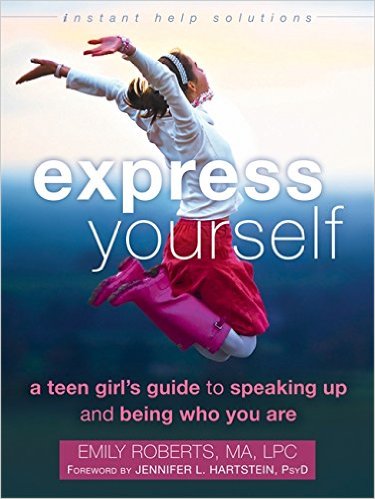#96 — Teen Boundaries Around Tech Usage ** February 24, 2016
Guest // Emily Roberts, MA, LPC ** Host // Carla Atherton
 Do you have trouble talking to your teens about creating boundaries around their usage of technology?
Do you have trouble talking to your teens about creating boundaries around their usage of technology?
Do you feel like they are sometimes lost to you, immersed in a world of blue lights and virtual relationships?
Do you want your teenager to have communication and social skills and healthy real-life relationships with their peers, family, and themselves and are worried about the power technology has over them?
Uh, yes!!! Please…
This whole new world of texting and the world wide web of the internet has made it such a massive challenge for parents to keep their kids safe. It is an added challenge to teach them healthy boundaries around what the internet exposes them to and what influences their choices, both of which influence the formation of their very self-esteem and self-image. BIG stuff!
Technology isn’t going away. How can we allow our children to use technology as a tool rater than become enslaved while still allowing them space for self-expression and connection? Listen to (R)evolutionary Mama’s interview with the Guidance Girl, Emily Roberts, about how we need to effectively face this issue head-on with clarity and direction.
 Emily Roberts, MA, LPC is a psychotherapist, parenting consultant, educational speaker, and published author. She is part of the Hartstein Psychological Services team in New York City practicing Dialectical Behavior Therapy (DBT) and Cognitive Behavior Therapy (CBT). Emily writes a weekly blog “Building Self-Esteem” for HealthyPlace.com and is the parenting consultant for Neurogistics Corporation. She is the co-founder of The Talking Room, a proactive program for girls ages 5-9 specializing in developing self-esteem, confidence, leadership, friendship skills, and stress reduction activities with an emphasis on creating healthy boundaries with technology. Emily has a Masters Degree in Counseling Psychology from St. Edwards University, Austin, Texas, specializing in children, young adults, adults, and families. She is LPC licensed and has extensive training and experience in working with a variety of populations and diagnosis including challenges such as life transitions, anxiety, depression, relationships, and eating disorders.
Emily Roberts, MA, LPC is a psychotherapist, parenting consultant, educational speaker, and published author. She is part of the Hartstein Psychological Services team in New York City practicing Dialectical Behavior Therapy (DBT) and Cognitive Behavior Therapy (CBT). Emily writes a weekly blog “Building Self-Esteem” for HealthyPlace.com and is the parenting consultant for Neurogistics Corporation. She is the co-founder of The Talking Room, a proactive program for girls ages 5-9 specializing in developing self-esteem, confidence, leadership, friendship skills, and stress reduction activities with an emphasis on creating healthy boundaries with technology. Emily has a Masters Degree in Counseling Psychology from St. Edwards University, Austin, Texas, specializing in children, young adults, adults, and families. She is LPC licensed and has extensive training and experience in working with a variety of populations and diagnosis including challenges such as life transitions, anxiety, depression, relationships, and eating disorders.













Lauren Arikan Mine are set up with automatic timers. That way there is no fighting with me for ten more minutes etc.
But also– many days are designated media-free days. Otherwise– these kids will do NOTHING physical the entire day. smile emoticon
We do the same!
An enriched environment provides latitude of choice and opportunities for self-regulation, in my experience. (not worried about it) smile emoticon
No wisdom from me …wisdom in the sense of success. Teenagers are in the period between childhood and adulthood, and so I wonder if we need to provide them more opportunities to take actions, to take risks, to make mistakes. Screen time provides intensity without apparent risks, and without the possibility of failure. We should all look back upon adolescence as a time intensity, when we should ask `what was I thinking“
Yell at them and keep them engaged. Live music, pool, dishes, food, laundry.
Live music meaning the kids playing together.
Love Fearless radio!!! Can’t wait
We do not allow tv during the week. We also don’t allow computer use during the week – except for homework. The cell phones on the other hand….
Is your teen always in the same room with you when using the computer for HW? If not, how do you know what they are doing with it? I have decided to surrender in this dept. My son is 15 and will need to be able to manage his screen usage on his own in a few years. I don’t want to send him off to college without experience doing that.
initially- yes. Now it’s on the honor system. They are pretty good and I agree – they need to learn to manage so much before college
We live blocks from the beach and in the middle of a forest. Very little if any TV.
None of this Wii / Blue Ray / DVR / Playstation.
Organized sports: School and Club.
My two girls are 18 and 24. Both survived the high school years successfully. From a young age we allowed them to make a lot of decisions. You pick your battles. We have a very open family and we talk a lot. We didn’t need to yell. We share our feelings and admit when we make mistakes. All of us. We instilled trusting your instincts and your own judgement but knowing that we were always there. If you try to restrict, kids want things even more and they don’t learn to regulate themselves. I have to say that they learned to regulate their time between a lot of activities, friend time, technology, music, etc. We encouraged their interests and listened to their concerns. They didn’t need to sneak behind our backs to do anything because they were able to talk to us. We weren’t angels and neither were they but that would be so boring and no one learns that way. No one wants to be one dimensional. If you set a good example and address your own issues, kids have respect for that. When parents don’t have addictions, it teaches kids not to either. smile emoticon
Threw out the TV 10 years ago. One of the best choices we made as parents. They get some TV at friends and family’s homes. All benefit, no downside.
Follow her on twitter,also excellent articles and info. Victoria Dunckley MD
@drdunckley
Integrative Child Psychiatrist. Expert on impact of #screentime on mood, focus, sleep & behavior. Blogger #PsychToday & author of Reset Your Child’s Brain.
Los Angeles, CA
ResetYourChildsBrain.com
Yes! I wonder about this balance every day. My kids are still small, we don’t own a tv or video games, but screen time is everywhere, and I am trying to get up to speed to have reasonable expectations and teach balance as they get older. Right now controlling works for me, but I’d like to be able to let them find their own balance. Will be listening in! Thanks!
Me!!